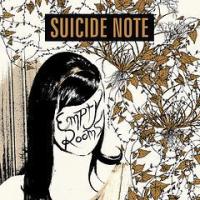Geoff Rickly isn't someone that on the surface I think I'd agree with. I'm not a fan of Thursday and I don't like the way he spells his name. Nevertheless, his recent article on the state of underground music and how the line between what is mainstream and authentically subversive is being constantly blurred struck a chord with me. What is considered "indie rock" today bears little resemblance to the ethic and aesthetic of hardcore/punk, but the bands that influenced these modern acts weren't far from it at all. Suicide Note, in some ways could be seen as a direct response to this movement away from the foundations of the American underground. Empty Rooms takes these influences and binds them into an extremely fulfilling mixture of hardcore's desperate shout, post-punk's groove, art-punk's noise and a rock ân' roll swagger for something that is both familiar and refreshing.
Album opener "Truly Historic" utilizes heavily distorted and noisy guitar lines that lock into the bass and drums to give the song a driving danceable feel that would not be out of place on the recent works by These Arms Are Snakes. Kurt Ballou's recording and mixing gives vocalist Casey Donley just enough presence and clarity in the song so that it almost seems as though he is being left behind by the rhythms while still being in time, thus creating an appropriate anxious feeling. Like any good piece of hardcore punk, while the song might lack discernable melody as the instruments are devoted mainly to rhythmic workings, the song is still really catchy and memorable with the refrains of, "For fuck sake, believe!!" and "Truly history! You must believe!." Suicide Note never stick to the same formula, though, and "Social Leper" finds the band still exploring the rhythmic changes in tempo but also finds melodic leads thrown in and Donley showing off a decent croon mixed in with his usual shouts.
A recurring device in literature is to use madness as a way to represent a character's departure from societal norms and conventions. When I first read the title Empty Rooms I immediately thought of Fugazi's "Waiting Room" and the idea of the clinical. The way the instruments and vocals are utilized on this album in sudden bursts and shifts moving over an unstable terrain give the listener a sense of the mad or the insane. Donley's lyrics throughout help lend credence to the idea that the speaker in these songs is a patient in a mental ward, such as the keyboard-driven "New Eyes" where his delivery reminds me of an Indian Summer song -- "You're so silent. I can't hear you. I can't reach you. I can't get you. No!! No!! I won't. I can't. I won't hear. Ha!." The melancholic tone makes you think the person is out of his mind or at a total disconnect from reality or society in which he lives.
Empty Rooms reveals itself to be an album that is unified in purpose of both sound and content, which can be a rare occurrence in today's scene. The results are an album that is both enjoyable when taken as a whole, as the songs are all working together to provide an overall context but at the same time the individual songs are strong enough to stand on their own. Simply put, a superb hardcore punk record, and highly recommended.
